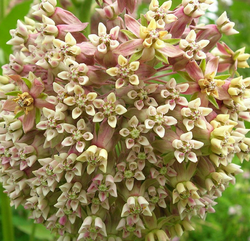 Asclepias syriaca, Milkweed Asclepias syriaca, Milkweed We can think of at least 180 great forest garden & perennial crops for cold climate Sweden. Want to hear about them? Over the course of the next year we will profile 5 a week on the blog. Perennial plants and crops offer a low energy, oil & resource input based foundation for future-proof agricultures. By default if an agriculture is to be called regenerative the bottom line is that it must be soil building, not soil depleting. Relentless deep tillage & poor soil husbandry (wifery?!) contributes to the majority of the 24 billion tons of topsoil lost every year on planet water. We are going to be focused on holistic polyculture grazing and perennial production at ridgedale over most of the site as this represents the most effective way to restore our degraded landscape, produce high value produce and ensure the future resource base we are managing holistically for in our decision making.
0 Comments
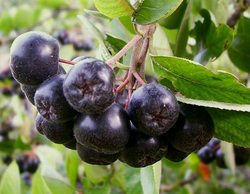 Aronia melanocarpa, Aronia Aronia melanocarpa, Aronia We can think of at least 180 great forest garden & perennial crops for cold climate Sweden. Want to hear about them? Over the course of the next year we will profile 5 a week on the blog. Perennial plants and crops offer a low energy, oil & resource input based foundation for future-proof agricultures. By default if an agriculture is to be called regenerative the bottom line is that it must be soil building, not soil depleting. Relentless deep tillage & poor soil husbandry (wifery?!) contributes to the majority of the 24 billion tons of topsoil lost every year on planet water. We are going to be focused on holistic polyculture grazing and perennial production at ridgedale over most of the site as this represents the most effective way to restore our degraded landscape, produce high value produce and ensure the future resource base we are managing holistically for in our decision making. 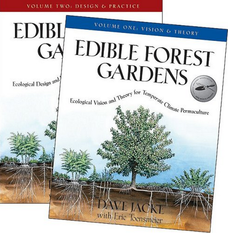 Want a free copy of Edible Forest Gardens 1 & 2? These books are awesome, and don't need much of an introduction. We think they should be in everybody's library. To celebrate the turn of the new year our fortnightly free book giveaway just got a whole lot juicier! The details of this next giveaway will be sent out to our awesome newsletter subscribers as a way of saying thank you for all the support we have had so far. We will give away a free copy of Volume 1 next week, then the following giveaway will see Volume 2 zipping out to someone somewhere in the world. And don't worry, our newsletter is not for spamming! It's customizable so you get the news, articles & updates you actually want... as well as awesome free giveaways like these... You've got 2 days if you want to be in the draw for these beauties, sign up now! 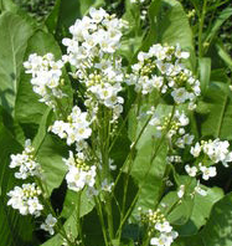 Armoracia rusticana, horseradish Armoracia rusticana, horseradish We can think of at least 180 great forest garden & perennial crops for cold climate Sweden. Want to hear about them? Over the course of the next year we will profile 5 a week on the blog. Perennial plants and crops offer a low energy, oil & resource input based foundation for future-proof agricultures. By default if an agriculture is to be called regenerative the bottom line is that it must be soil building, not soil depleting. Relentless deep tillage & poor soil husbandry (wifery?!) contributes to the majority of the 24 billion tons of topsoil lost every year on planet water. We are going to be focused on holistic polyculture grazing and perennial production at ridgedale over most of the site as this represents the most effective way to restore our degraded landscape, produce high value produce and ensure the future resource base we are managing holistically for in our decision making. 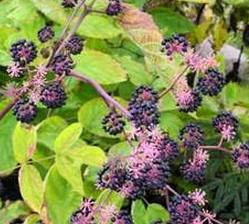 Aralia cordata, Udo Aralia cordata, Udo We can think of at least 180 great forest garden & perennial crops for cold climate Sweden. Want to hear about them? Over the course of the next year we will profile 5 a week on the blog. Perennial plants and crops offer a low energy, oil & resource input based foundation for future-proof agricultures. By default if an agriculture is to be called regenerative the bottom line is that it must be soil building, not soil depleting. Relentless deep tillage & poor soil husbandry (wifery?!) contributes to the majority of the 24 billion tons of topsoil lost every year on planet water. We are going to be focused on holistic polyculture grazing and perennial production at ridgedale over most of the site as this represents the most effective way to restore our degraded landscape, produce high value produce and ensure the future resource base we are managing holistically for in our decision making. 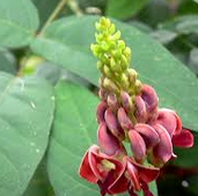 Apios americana, Groundnut Apios americana, Groundnut We can think of at least 180 great forest garden & perennial crops for cold climate Sweden. Want to hear about them? Over the course of the next year we will profile 5 a week on the blog. Perennial plants and crops offer a low energy, oil & resource input based foundation for future-proof agricultures. By default if an agriculture is to be called regenerative the bottom line is that it must be soil building, not soil depleting. Relentless deep tillage & poor soil husbandry (wifery?!) contributes to the majority of the 24 billion tons of topsoil lost every year on planet water. We are going to be focused on holistic polyculture grazing and perennial production at ridgedale over most of the site as this represents the most effective way to restore our degraded landscape, produce high value produce and ensure the future resource base we are managing holistically for in our decision making. 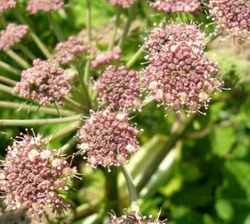 Angelica sylvestris, Angelica Angelica sylvestris, Angelica We can think of at least 180 great forest garden & perennial crops for cold climate Sweden. Want to hear about them? Over the course of the next year we will profile 5 a week on the blog. Perennial plants and crops offer a low energy, oil & resource input based foundation for future-proof agricultures. By default if an agriculture is to be called regenerative the bottom line is that it must be soil building, not soil depleting. Relentless deep tillage & poor soil husbandry (wifery?!) contributes to the majority of the 24 billion tons of topsoil lost every year on planet water. We are going to be focused on holistic polyculture grazing and perennial production at ridgedale over most of the site as this represents the most effective way to restore our degraded landscape, produce high value produce and ensure the future resource base we are managing holistically for in our decision making. 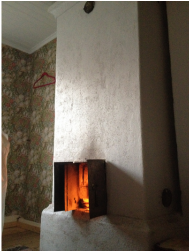 Utilising thermal mass to make wood-based heating is getting very popular with rocket mass stoves, etc. Here in the colder climates this technology has existed since Neoglacial and Neolithic periods. I just came in at 2pm and our 100yr old stove is as warm as a typical radiator would be, with the house at a comfortable 20°C and we only lit a very small fire over 12 hours ago. It's 1 °C outside. I just fired it up again and this small fire will see us through until tomorrow night. Various models exist in older homes here, often very beautifully crafted. There is a knack to learning it's temperaments, but they are highly efficient. Often they sit as a ornate feature whilst electric radiators do the work these days, sad really. One thing to be sure of is not to close the damper until the fire is totally out, otherwise you risk carbon monoxide poisoning which still kills a lot of folks every year. These types of stove are usually made of masonry such as brick (firebrick), tile, stone, stucco, or a combination of materials, rather than steel or cast iron. It is freestanding, and usually requires special support to bear its weight. It consists of a firebox and heat-exchange channels or partitions that provide additional surface area. These absorb heat from the hot exhaust gases before the gases exit into the chimney. The fire in a masonry heater burns much hotter than in a metal stove. Very hot fires reduce emissions significantly. When not being fired, the connection from the masonry heater to the chimney sometimes has a damper to prevent heat from escaping up the chimney; the heat is then radiated from the masonry.
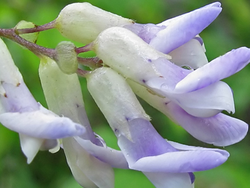 Amphicarpa bracteata, Hog Peanut Amphicarpa bracteata, Hog Peanut We can think of at least 180 great forest garden & perennial crops for cold climate Sweden. Want to hear about them? Over the course of the next year we will profile 5 a week on the blog. Perennial plants and crops offer a low energy, oil & resource input based foundation for future-proof agricultures. By default if an agriculture is to be called regenerative the bottom line is that it must be soil building, not soil depleting. Relentless deep tillage & poor soil husbandry (wifery?!) contributes to the majority of the 24 billion tons of topsoil lost every year on planet water. We are going to be focused on holistic polyculture grazing and perennial production at ridgedale over most of the site as this represents the most effective way to restore our degraded landscape, produce high value produce and ensure the future resource base we are managing holistically for in our decision making. 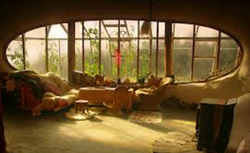 Inside Simon & Jasmines home at Lammas Inside Simon & Jasmines home at Lammas Our friend Simon Dale is well known all over the world after the viral spread of photos of his original "hobbit house" across the web. Pioneers at the awesome Lammas project in Wales, this short interview was filmed last summer at Simon and Jasmine's new home in Wales. Taking a couple of months and a few thousand Euro's to build the main frame of the house, one aspect we appreciate about this type of building is the integration of various aspects of Permaculture design into truly affordable and functional homes. Organic Merino Wool base- layers I'm so chuffed with my organic Merino thermal base layers that I've just bought my 3rd pair. They are not the cheapest thermals, but wearing them for up 6 months of the year I wouldn't have it otherwise. For cold climates layered clothing systems are awesome, and need to be able to transfer moisture, provide a lot of warmth, and protect from wind and rain. The merino’s fleece is built for extremes – breathable in summer, insulating in winter, yet the wool is exceptionally soft and lightweight. Compared to other wool products, it's very comfortable against the skin. It is naturally breathable and warm even when wet. Merino regulates body temperature, has a great warmth-to-weight ratio and naturally controls odor. I won't tell you how long I've kept mine on before without washing them... 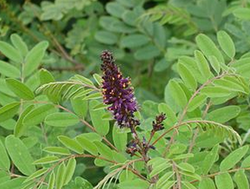 Amorpha fruticosa, False indigo Amorpha fruticosa, False indigo We can think of at least 180 great forest garden & perennial crops for cold climate Sweden. Want to hear about them? Over the course of the next year we will profile 5 a week on the blog. Perennial plants and crops offer a low energy, oil & resource input based foundation for future-proof agricultures. By default if an agriculture is to be called regenerative the bottom line is that it must be soil building, not soil depleting. Relentless deep tillage & poor soil husbandry (wifery?!) contributes to the majority of the 24 billion tons of topsoil lost every year on planet water. We are going to be focused on holistic polyculture grazing and perennial production at ridgedale over most of the site as this represents the most effective way to restore our degraded landscape, produce high value produce and ensure the future resource base we are managing holistically for in our decision making.  A lot of folks will be familiar with Paul Stamets incredible work and read his awesome books. I thought this filmed presentation gives a fantastic overview of Paul's diverse and incredible work. From cleaning hydrocarbon spills to redesigning commuter transport networks with slime molds, this is an incredibly interesting talk from the worlds foremost mycologist. 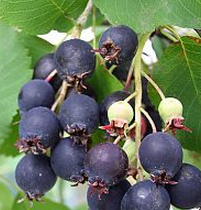 Amelanchier alnifolia, Saskatoon Amelanchier alnifolia, Saskatoon We can think of at least 180 great forest garden & perennial crops for cold climate Sweden. Want to hear about them? Over the course of the next year we will profile 5 a week on the blog. Perennial plants and crops offer a low energy, oil & resource input based foundation for future-proof agricultures. By default if an agriculture is to be called regenerative the bottom line is that it must be soil building, not soil depleting. Relentless deep tillage & poor soil husbandry (wifery?!) contributes to the majority of the 24 billion tons of topsoil lost every year on planet water. We are going to be focused on holistic polyculture grazing and perennial production at ridgedale over most of the site as this represents the most effective way to restore our degraded landscape, produce high value produce and ensure the future resource base we are managing holistically for in our decision making. 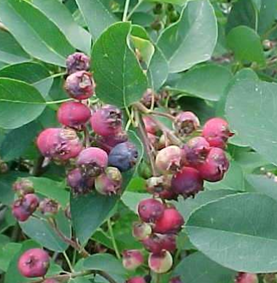 Amelanchier stolonifera, running juneberry Amelanchier stolonifera, running juneberry We can think of at least 180 great forest garden & perennial crops for cold climate Sweden. Want to hear about them? Over the course of the next year we will profile 5 a week on the blog. Perennial plants and crops offer a low energy, oil & resource input based foundation for future-proof agricultures. By default if an agriculture is to be called regenerative the bottom line is that it must be soil building, not soil depleting. Relentless deep tillage & poor soil husbandry (wifery?!) contributes to the majority of the 24 billion tons of topsoil lost every year on planet water. We are going to be focused on holistic polyculture grazing and perennial production at ridgedale over most of the site as this represents the most effective way to restore our degraded landscape, produce high value produce and ensure the future resource base we are managing holistically for in our decision making. Getting a good Microscope for on farm monitoring of soil development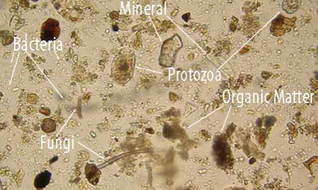 View of soil organisms (image courtesy mauby.com) View of soil organisms (image courtesy mauby.com) Life in the soil is what drives fertility. As primary producers our responsibility is to feed, nourish and grow soil. At a training for farmers on the King & Queens home island in Stockholm we looked at several effective ways for farmers & land managers to engage in the monitoring of the impacts of their activities & decision making on soil health. Certain tools are really worth having. A good soil microscopy unit means we can monitor population changes of soil foodweb organisms, monitor compost processes and create compost teas that are simply teaming with beneficial support organisms to restore healthy populations back into the soil. Building healthy soil is our primary responsibility and the core solution to many agricultural problems.
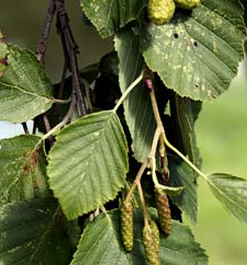 Alnus incana, Grey alder Alnus incana, Grey alder We can think of at least 180 great forest garden & perennial crops for cold climate Sweden. Want to hear about them? Over the course of the next year we will profile 5 a week on the blog. Perennial plants and crops offer a low energy, oil & resource input based foundation for future-proof agricultures. By default if an agriculture is to be called regenerative the bottom line is that it must be soil building, not soil depleting. Relentless deep tillage & poor soil husbandry (wifery?!) contributes to the majority of the 24 billion tons of topsoil lost every year on planet water. We are going to be focused on holistic polyculture grazing and perennial production at ridgedale over most of the site as this represents the most effective way to restore our degraded landscape, produce high value produce and ensure the future resource base we are managing holistically for in our decision making. 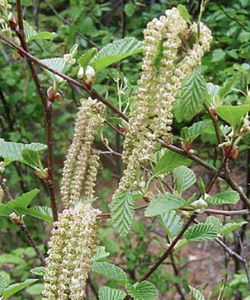 Alnus sinuata, Sitka alder Alnus sinuata, Sitka alder We can think of at least 180 great forest garden & perennial crops for cold climate Sweden. Want to hear about them? Over the course of the next year we will profile 5 a week on the blog. Perennial plants and crops offer a low energy, oil & resource input based foundation for future-proof agricultures. By default if an agriculture is to be called regenerative the bottom line is that it must be soil building, not soil depleting. Relentless deep tillage & poor soil husbandry (wifery?!) contributes to the majority of the 24 billion tons of topsoil lost every year on planet water. We are going to be focused on holistic polyculture grazing and perennial production at ridgedale over most of the site as this represents the most effective way to restore our degraded landscape, produce high value produce and ensure the future resource base we are managing holistically for in our decision making. 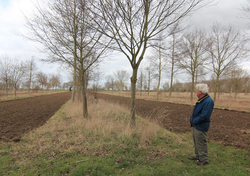 Having had the pleasure of visiting and researching some of the best agroforestry sites in Europe I thought some folks might enjoy this interview I filmed with Professer Martin Wolf over in Suffolk, UK. The video is probably far too slow if you suffer a 3-minute-social-media-saturated-attention-span but personally I would happily sit and listen to Martin for hours. The video begins with Martin recounting his work as a grain disease specialist at Cambrige University- which led to broad scale East German adoption of multi- variety grain production and subsequent huge reductions in fungicides (which quickly fell apart when the wall came down) 350,000 ha under this production system in Germany sadly fell to 20,000ha almost overnight. 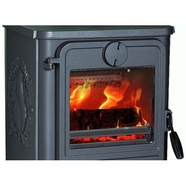 The Morso Squirrel The Morso Squirrel Morso are a Danish cast iron stove manufacturer dating back to 1853. Whilst there are endless solutions in terms of wood stoves and alternatives I recommend these time tested stoves as I have relied on a woodburner a large amount of my life and have had 3 of these. Some of their modern stoves look a little whack in my eyes, but this classic little number kicks out 4.6 kW and can house a back boiler for radiator/ storage tank connection. They are just a simple & well built piece of engineering. Whilst super- efficient alternatives to wood fuel exist, eg, rocket stove mass heaters, in some scenarios efficient stoves are more reliable/ practical/ meet local legislation. 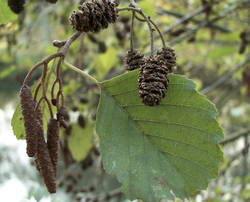 Alnus glutinosa, European Alder Alnus glutinosa, European Alder We can think of at least 180 great forest garden & perennial crops for cold climate Sweden. Want to hear about them? Over the course of the next year we will profile 5 a week on the blog. Perennial plants and crops offer a low energy, oil & resource input based foundation for future-proof agricultures. By default if an agriculture is to be called regenerative the bottom line is that it must be soil building, not soil depleting. Relentless deep tillage & poor soil husbandry (wifery?!) contributes to the majority of the 24 billion tons of topsoil lost every year on planet water. We are going to be focused on holistic polyculture grazing and perennial production at ridgedale over most of the site as this represents the most effective way to restore our degraded landscape, produce high value produce and ensure the future resource base we are managing holistically for in our decision making. A little interview of a brief visit I made to Etienne Bonvallet (JP's nephew and technical collaborator) I made with Mark Anthony last year- to find out what we needed to know to start implementing this truly regenerative technology for ourselves. (You can read JP's book Another Kind Of Garden at our friend's Josef Davies-Coates awesome online library) With the digital world as it is, if you research online you'll probably find a lot of copy- paste articles relating to JP and his wood powered compost work that seem to often mix up facts and figures. By far the leaders in this tech. today are Native Power over in Germany. Below you'll find the original inspiring JP posts I guess most folks have seen. The only slight illusion here is the 2CV powered by gas- they stopped this very quickly- compressing gas to 80 bar on homespun rigs is a little risky!
Here's a short film I made with Joseph Holzer up at the Krameterhof last summer. Located 1100 - 1500m above sea level in the Lungau Region in the heart of Austria, this is still one of the best farms in Europe in my mind. With 1.7 days over 30°C (86F), 25 days above 25°C (77F) there is over 160 days of frost including 50 days with no water flow. The systems are very well established, diverse & complex- even to a trained eye it is a lot to take in. Apologies the subtitles are not as clear as they deserve to be, having lost the original files I have done all I can with this colour change. |
Details
Like us on FB Below for regular updatesStay up to date with customized updates you want to receive
Upcoming coursesArchives
December 2016
Categories
All
|
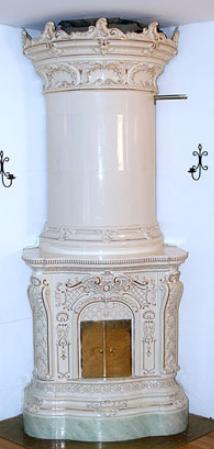


 RSS Feed
RSS Feed